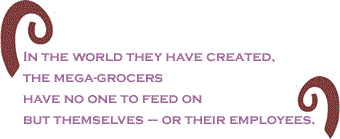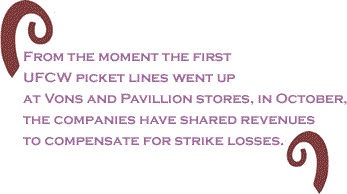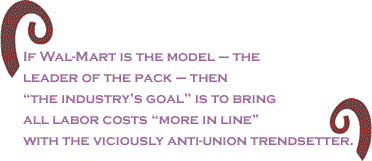
|
|||||||||||||||||||||
|
The only competition that exists among the corporate players at the commanding heights of the American economy, is the race to determine who can squeeze the workers first, and hardest. Nothing illuminates this reality more starkly than the southern California supermarket strike and lockout, now in its fifth month. Displaying a class solidarity that would make Mao Tse-tung’s Army blush a deep red, a united front of grocery chains is determined to destroy the middle class dreams of 70,000 union workers. The Safeway, Kroger and Albertsons chains and their subsidiaries claim underdog status, as they grind $10 an hour workers into the dirt. “Wal-Mart is coming, Wal-Mart is coming!” they cry, moaning that the non-union retail behemoth’s labor costs are about 20 percent lower than industry norms. Yet, according to the June, 2003 issue of Forbes Magazine:
 The
truth is, Wal-Mart does want to take over the world – but
so do the managements of its strike-provoking competitors,
who swallowed schools of smaller fish to control 70 percent
of grocery sales in the top 100 markets. Certainly, Wal-Mart
is closing fast, with $53 billion in grocery sales and
1400 “supercenters” in 42 states, but the “real problem” is
much deeper than the folks at Forbes can safely grasp without
losing their capitalist minds. In the world they have created
for themselves in which corporate death is avoided only
through constant increases in dividends, and having eaten
nearly all of the smaller prey, the mega-grocers have no
one to feed on but themselves – or their employees. They
began chewing on the workers in the first week of October – all
the while blaming it on Wal-Mart. In reality, Wal-Mart was simply leading the way down a road that Safeway and Kroger would soon be traveling, anyway. "Wal-Mart made us look at ourselves and reinvent ourselves," said Dick Tillman, an executive in charge of five southern states for the Kroger chain, in an interview with the Wall Street Journal, last year. Let’s make it plain: The problem is not that there is too much competition in the retail food business, even of the cutthroat, Wal-Mart kind. Rather, the chains have loaded themselves down with debt to eliminate the previously existing competition, and there are not enough customers with enough income to buy enough goods to pay off creditors and satisfy the ever more ravenous demands of investors at the same time. So they decided to cut labor costs by forcing a strike and lockout of United Food and Commercial Workers (UFCW) members throughout southern California. Wal-Mart provided the excuse to do what comes naturally to the corporate class in George Bush’s America. Wal-Mart is leader of the pack, but they are all wolves.
It is correct to say that the UFCW strike is a “Wal-Mart strike,” in the sense that Safeway, Albertsons and Kroger have chosen to “re-invent” themselves as Wal-Marts – and with the ferocity of the newly converted. However, it would be unwise to treat Wal-Mart as some uniquely villainous entity. The Bentonville, Arkansas corporation is simply more aggressive and self-consciously ideological than its boardroom counterparts. But it is not another species. Wal-Mart’s corporate “personality” operates according to the same imperatives as the rest of the pack, who are far more admiring of their leader than resentful. Class solidarity means the owners share a common war chest. There is not even a pretense of corporate competition when it comes to making war on workers. From the moment the first UFCW picket lines went up at Vons and Pavillion stores, in October, the companies have shared revenues to compensate for strike losses. The arrangement is legal, they claim, because the chains all have contracts with the same union. California Attorney General Bill Lockyer has filed an antitrust suit charging revenue sharing hurts consumers. "This action is about protecting shoppers against unlawful, anticompetitive conduct that keeps prices artificially high," said Lockyer. The companies have, in effect, suspended competition to engage in price-fixing, from which all of them benefit. The suit contends the agreement "essentially freezes the pre-strike market share." Real money changes hands, according to equity analyst Andrew Wolf. If pickets deter shoppers from Safeway and Albertsons locations, but traffic is heavier at Krogers-owned stores, then "Kroger would actually write checks to the other two," said Wolf. Safeway lost nearly $700 million in the last quarter, but only $100 million due to the strike, say company executives – and some of that was covered by revenue sharing. Yet Safeway’s stock rose 70 cents, last week. How could that be? Because Wall Street is rooting for the home team, home being anyplace where corporate diktat is challenged. When issues that really matter to the corporate class are at stake, the rules of the game are rigged by hype-masters in the money markets: workers beat down, stock goes up – hip-hip, hooray!
Business Week, like Forbes, speaks to the corporate class. Lies are for outsiders; businessmen need to know the real deal: “The industry's goal is to bring its health-care costs more in line with those of nonunion Wal-Mart Stores,” said the February 12 Business Week. “The retail giant's medical plan covers fewer than half its workers, and its sales clerks earn less, on average, than the federal poverty level.” Of course, there is nothing intrinsically special about the cost of health care – for the company, it’s just another labor expense, albeit a fat and growing one. If Wal-Mart is the model – the leader of the pack – then “the industry’s goal” is to bring all labor costs “more in line” with the viciously anti-union trendsetter. The larger objective is to break the union, as an organization or in spirit. From the current corporate perspective, level playing fields can only exist when the employees are flat on their backs. Executives from purportedly competing companies conspire and collude toward that end, all the while pleading that “The Devil (Wal-Mart) made me do it.” The Devil and his disciples at Safeway, Kroger and Albertsons have access to the same numbers, and move inexorably in the same direction. It is their nature. The supermarkets offer to the striking and locked out UFCW workers amounts to a 65 percent cut in the employers’ health care contribution: from the current $3.85 per hour worked to $1.35. The owners dispute this figure, but in eagerly following Wal-Mart’s model they have telegraphed the fact that there is no limit to how far they are willing to reduce labor costs. If there is a bottom, Wal-Mart will find it first, and the pack will eagerly follow.
Wal-Mart can also teach its acolytes how to profit from poverty. Although the Walton family spends millions on rightwing causes to undermine what’s left of the social safety net, their corporation urges employees to apply for every available government assistance. According to a report prepared by the House Committee on Education and the Workforce, federal taxpayers subsidize the typical, 200-employee Wal-Mart store at the rate of $420,750 a year. Rep. George Miller charges Wal-Mart is the source of "downward spirals in communities." Wal-Mart excuses its bare bones health care plan – which covers no one working less than 34 hours a week – on the grounds that about 40 percent of their “associates” get health coverage through their otherwise employed spouse’s plans. The rationale appears to be: employees whose spouses work at better places have no need for health insurance. The striking southern California grocery workers who depended on the company plan no longer have health benefits, and must get by on $100 dollars a week doled out from the union strike fund. They don’t want to be the first line of defense against a highly mobile corporate assault on living standards in America – but they have no choice. They are in the way of a yelping wolf pack, led and inspired by Wal-Mart. |
February
19
2004 |
|||||||||
|
|||||||||
|
|
|||||||||
| Printer Friendly Version | |||||||||
 |
|||||||||
| |
|||||||||
| |
|||||||||




























